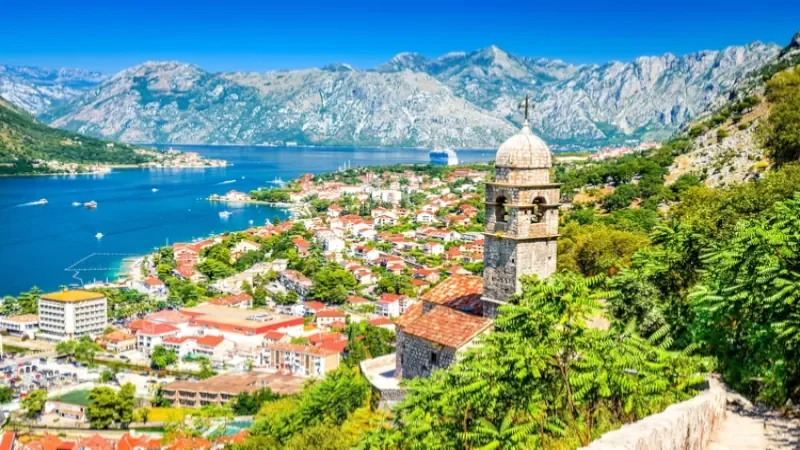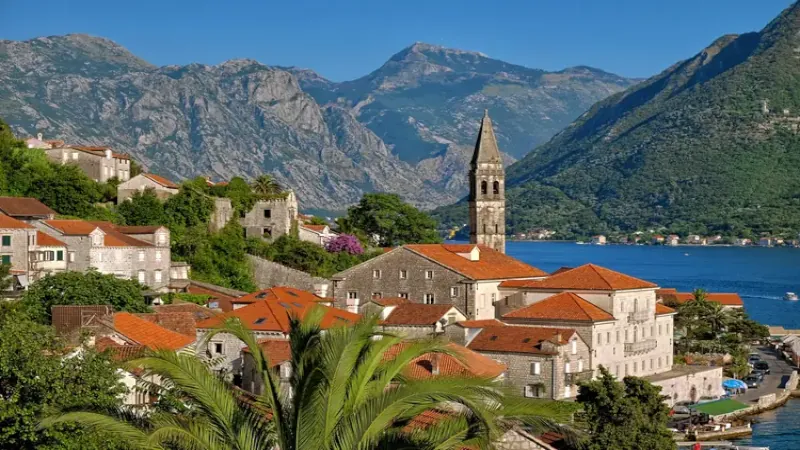Rent From $400 A Month In Old World Europe
Our hot off the presses 2026 Overseas Retirement Index features 12 of the world’s best destinations for a move abroad—six...
Home » Best Countries To Live, Invest, And Retire Overseas » Europe » Montenegro
Montenegro: Luxury Life Along The Mediterranean For Less

Montenegro, a tiny country in the Balkans, is unknown by many. But, in recent years Montenegro has become an up-and-coming expat destination.
Above all, those who have discovered this Eastern European destination enjoy its mild climate, beautiful scenery, low cost of living, and relaxed lifestyle.
Montenegro is particularly popular amongst adventure seekers. Its rugged geography provides optimum conditions for snow sports during winter and stunning hiking trails in the summer.

Reviewed By Kathleen Peddicord
Kathleen is the Live and Invest Overseas Founding Publisher. She has more than 30 years of hands-on experience traveling, living, and buying property around the world.
Start Your New Overseas Life Today
A world full of fun, adventure, and profit awaits! Sign up for our free daily e-letter, Overseas Opportunity Letter, and we’ll send you a FREE report on the 12 Best Places To Retire Overseas In 2026
We Value Your Privacy! We will not share your email address with anyone else, period.
Most importantly, the entire country is covered by mountains, hence its name Black Mountain (monte=mountain negro=black).
Also, Montenegro shares its borders with Serbia, Bosnia and Herzegovina, Albania, Kosovo, and Croatia while enjoying 295km of coastline along the Adriatic Sea.
This unique location between Europe and Russia leads to a fascinating blend of cultures. Montenegro’s European influence can be seen in its Gothic, Venetian, and Romanesque architecture, while its traditional cuisine is a reminder of its past under the Ottoman Empire.
Montenegro is a young country, only gaining complete independence from Serbia in 2006. Despite this, it has a strong economy, stable democracy, and is currently awaiting acceptance into the European Union.
Above all, Montenegro is one of the best markets for both lifestyle and profit, not just in Europe, but in the world.
Now is the time to invest in Montenegro— real estate is cheap, taxes are low, and residency is easy.
Montenegro enjoys a pleasant Mediterranean climate along its coast, similar to other countries on the Adriatic. Summers are hot and dry, while winters can be cold.
Move inland, and experience a more Continental climate with significantly colder winters, providing optimum conditions for snow sports.
English isn’t widely spoken in Montenegro. As a result, workers in the tourist industry will have a basic level, but in more remote areas, people generally don’t speak English.
But, you’ll need to pick up some Montenegrin to get by day-to-day, to deal with governmental admin, and to gain citizenship you’ll be required to pass a simple proficiency test.
Montenegrins are known for their warmth, sense of humor, and generosity. Also, they are active promoters of a relaxed, slow lifestyle and are happy to take their time getting to know expats and teaching the local lingo.
Crime levels are low overall, yet slightly higher in tourist areas. So, simply take the usual precautions as you would in other busy tourist destinations.
If you’re searching for a retirement destination with a pleasant climate, friendly locals, plenty of outdoor activities, and a cheap cost of living, don’t overlook Montenegro.
Relocating here gives you a prime location to explore the rest of Europe. Montenegro has a tight-knit expat community, making it easy to meet new people and settle in.
Montenegro is one of Europe’s most affordable destinations. Real estate prices inland are low, even in the capital, Podgorica.
Property prices rise along the coastline, especially in popular tourist destinations such as Porto Montenegro, a port filled with superyachts belonging to Europe’s elite.
Day-to-day living in Montenegro is a lot cheaper than in the States or Canada. Groceries are affordable, as are public transportation costs and even health care. If you plan to live in Montenegro’s remote mountainous regions, you’ll need your own car.
Owning a car in Montenegro is inexpensive, and you can register it easily if you have a temporary residence permit.

Since Montenegro is a new country, certain public services are still developing. This is unfortunately the case with health care, as it falls behind European standards.
For instance, the public health care system is inadequately funded, resulting in poor quality of care, long wait times, and a lack of trained professionals.
Expats should invest in quality international health care insurance. This will guarantee access to the high-quality private medical clinics in Montenegro, where doctors speak English and the facilities are modern.

As there are no direct flights from the U.S. to Montenegro, you’ll have to make a stopover in a European city on your way there.
While connecting flights can be a hassle, the benefit is that you can fly out from most international airports in the U.S.
You’ll need to arrange a company to deliver your belongings to your new home. This can be done either by plane or by boat.
Hundreds of companies are available online ready to offer their services in your transition to your new life.

Montenegro is well-known among investors… but it has big, yet undiscovered potential when it comes to lifestyle, specifically as a retirement haven and digital nomad hub.
It has a mild climate, a Mediterranean coastline, a low cost of living, access to nature, diverse recreation opportunities, stunning scenery, and places to sit back and enjoy yourself (outdoor cafés overlooking the sea, rooftop bars, and so on).
Three main towns make up this little bay coast: Kotor, Tivat, and Hercig Novi.
Kotor is in the southeastern corner of the bay. The jewel in its crown is Kotor Old Town, a three-sided walled city of great historical significance that’s widely regarded as the best-preserved medieval town in the Mediterranean.
Kotor is not just Kotor Old Town. It stretches for a few miles to the north and northwest, with little towns and villages lumped in with it.
One of these small towns is Perast, about 12 kilometers north of Kotor Old Town. It’s tiny but has charming historical buildings and a quiet, relaxed, village feel.
Kotor, Montenegro, could be an option for you if you want to be near the historical center of this region or right inside it. You could live right in Kotor Old Town, although it’d be a niche choice…
It’s a tiny area. And, you could walk from one end to the other in about five minutes.
For instance, a couple times a day, tourists unload from massive cruise ships and overwhelm its narrow streets… something you’d have to accept if you chose to live here.
Kotor is shaped like a V and surrounded by tall mountains. The downside to living here is that, for half the day, one side of the V gets sunshine while the other side is in the shadows…
This pattern reverses as the sun makes its way across the sky. In short, no matter where you choose to be in Kotor, you’re going to be in relative darkness for half the day.
Just a 15-minute drive from Kotor is Tivat. The two towns are bisected by a mountain and connected by a highway tunnel.
Tivat has more wide-open valley views compared to Kotor’s steep mountain views… The scenery isn’t quite as dramatic, but it gets blasted by sunshine all day.
In short, Tivat has a more modern, lively feel than Kotor. The main town has businesses, restaurants, cafés, shops, housing of all kinds, and a couple of small parks.
Also, Tivat has a long boardwalk on the water, which leads to Porto Montenegro.
Porto Montenegro is one of the bay’s luxury modern developments, where the rich and famous like to hang out. The boardwalk transforms into something much more manicured, and you start to pass bigger and more expensive-looking boats as you walk along it.
It boasts high-end restaurants, swanky shopping, and a sleek marina with massive yachts tethered up just off the boardwalk. It also has residences—all brand-new and designed to look like Tuscany aesthetically, but modern.
Porto Montenegro is a place to see and be seen. You pick up on that based on the way people who live and hang out here dress and carry themselves. It’s one of several such luxury developments scattered around the bay.
There’s also Portonovi in Hercig Novi and Lustica Bay, just outside the bay. They offer yet another niche lifestyle type, one that is steeped in luxury and a high level of comfort, though not necessarily authentic.
If you want Old World, European charm, head to Kotor Old Town or Perast.
The combination of medieval architecture backed by sharp gray mountains with old stone walls climbing up, all overlooking dazzling sea views, is something out of a fairy tale.
Saint Tryphon Cathedral, built in the 11th century and one of the country’s two Roman Catholic cathedrals, is a notable structure in the Old Town. Its church bells ring out often and reverberate around the mountain walls.
A couple of small museums are found in the Old Town, like the Maritime Museum, where you can learn about Kotor’s famous seamen, and the off-beat Cats of Kotor Museum, with an impressive collection of engravings, antique books, coins, medals, and more, mostly from Venice.
Modern amenities, like restaurants, cafés, and plenty of artisanal gelato shops, are available, too. Local cuisine is heavily Italian-inspired… but for a taste of something local, try rakija, a grape brandy. Montenegro also has its own wine and beer industries.
A 15-minute drive north of Kotor Old Town is Perast, a small, historic stone village. Off of Perast’s shore are two islands that are steeped in local folklore: Saint George and Our Lady of the Rocks, both of which you can visit.
The former features a church, which, according to legend, was built in 1603 after fishermen came across an icon of the Holy Mother of God at the site. The latter is also steeped in legend…
Supposedly, a French soldier was once stationed there and fired a canon at the house where his beloved lived. (The island’s other name is “island of the dead captains.”)
In Tivat, the attractions are less history-based…
In short, Tivat is where you go when you want a flashy night out on the town, whether you want to indulge in a gastronomic experience at one of the chic restaurants, sip craft cocktails while watching the sunset, or break the bank at Louis Vuitton or Balenciaga.
There’s lots to do in Kotor Bay and many ways to be entertained, including the occasional opera, symphony orchestra, and events related to local culture… But this is not Paris or London.
The main appeal of the area is what’s available in terms of nature…
Montenegro’s geography is mind-boggling. You notice when you fly into the country that it’s full of dramatic mountain peaks. What else can you expect when the country’s name literally translates to “black mountain.”

Every local I spoke to boasted about the amazing recreation opportunities available here…
In the Bay of Kotor, it’s all about the sea. You can do any type of water-based sport you like.
Above all, the boating lifestyle specifically is a major draw, and it’s not just for Saudi princes and Russian oligarchs, who are known to moor their mega-yachts here.
Marinas are available in the following places:
Land-based attractions include hiking in the hills that surround Kotor Bay. For exampple, an easy afternoon hike starts in Kotor Old Town and takes you up the mountain slope behind it, passing the old crumbling city walls and other ruins as you ascend.
Austro-Hungarian fortresses lie scattered in the hills and forests surrounding Kotor. Visiting them combines a hike and a little historical education… Fort Vrmac is worth a visit. It dates to 1860 and saw action in WWI, when it was bombarded by Montenegro.
Within a couple hours’ drive of Kotor Bay, there are several national parks.
Lovcen National Park has peaks of 1,749 meters (5,738 feet), which you can hike up. Durmitor National Park is UNESCOrecognized and contains Europe’s deepest gorges.
Most importantly, there are two main ski resorts: Ski Resort Kolasin 1450 and Ski Resort Savin Kuk, with smaller ski centers nearby.
Facilities, like equipment rentals, ski-lifts, ski schools, and more, are all set up here. Montenegro has big potential as Europe’s next ski destination.
Because of this country’s extreme landscape, it’s naturally an extreme sport destination… Paragliding, rafting down the Tara River Canyon, rock climbing…
Whatever adrenaline-spiking activity you’re into, you can probably do it here…

We’ve been shining a spotlight on this underexplored haven… but of course, no place is perfect and here at Live And Invest Overseas we’re known and trusted for our “warts-and-all” coverage of the destinations on our beat.
So, today, let’s take a look at both the pros and cons of expat life in Montenegro…
The downside to Montenegro as a place to live is that it’s far away from North America within the context of Europe… So far away, in fact, that many North Americans have never heard of this country.
The flight path between Montenegro and the United States and Canada is not direct. Plus, the costs can add up if you’re looking to make regular trips home.
One-stop flights take about a day (including layover) and start from about US$1,000 (one-way).
While we all know looks aren’t everything, it’s hard to ignore this country’s stunning natural beauty. Jaw-dropping vistas are available from almost every vantage point. Towering mountains plunge down into crystalline Adriatic waters and white-stone historical villages abound…
Kotor Old Town is the best-preserved medieval town on the Med. It’s a compact, triangular area that you access through three gateways. It’s dense with ancient architecture, plazas, and churches. Behind it, crumbling city walls zigzag up the steep mountain; in front of it is the sea.
Infrastructure in Kotor Bay isn’t brilliant… Buses go all over the place but they are too inconsistent to be relied on. You need your own means of transportation to make the most of life here.
Access for people with mobility issues varies across the bay…
Tivat is the most accessible option for people who are wheelchair bound because it’s the most modern. Buildings that have multiple floors are likely to have elevators, and restaurants and shops are level with the town’s long, flat boardwalk.
Kotor Old Town is not very accessible. Most shops make you go up at least one step to enter, and there aren’t many ramps.
For instance, old buildings in this area do not have elevators, and the UNESCO status likely means that can’t be retrofitted for them.
In short, it’s best to stick to the areas with more modern development, like Tivat and parts of Kotor, if you have a mobility issue.
You can feel completely comfortable walking around at any time of day or night, without any fear of crime. Locals tell me this is thanks to the small population.
Most importantly, everyone knows everyone, so it’s hard to get away with bad behavior.
Health care is a mixed bag… Some expats don’t feel comfortable using it for complicated procedures, while others do.
Most importantly, it’s free if you’re living in Montenegro on a temporary residence permit, which is a boon. That said, many expats prefer to keep a private insurance plan in place for access to private clinics and quicker treatment.
Regardless, it could use improvement to meet European health care standards.
We identify Montenegro and Kotor Bay specifically as the next Mediterranean jetset market.
Kotor Bay offers the potential for high rental yields… and you can take a position here for under 105,000 euros.
You can buy property of any value in Montenegro and be automatically eligible for legal residency in the country. A property investment here has the potential for rental yields and price appreciation, and also brings currency diversification.
Plus, it’s a residency opportunity that could amount to the cheapest and easiest backdoor to the EU that exists.
Some say the admin for anything you want to get done is painfully slow… To quote one expat, “To give you a picture of administration in Montenegro, take the bureaucracy of France… but add inefficiency to it.”
Property, rent, utilities, meals, and more are affordable in Montenegro.
You can lower your current cost of living by moving here. A budget of 1,500 to 2,000 euros per month would see a couple living comfortably here.
Also, you can rent a small, one- or two-bed apartment in Kotor Old Town for about 800 euros per month or buy a modest, two-bedroom home, albeit one likely in need of some TLC, for as little as 50,000 euros.
Click on any highlighted city or region to explore in-depth guides on what life is like there—from cost of living and climate to culture and real estate opportunities. Each location featured is one we’ve carefully reviewed and consider among the most livable and investment-friendly spots in Montenegro. Use this map as your starting point for discovering where in Montenegro your ideal lifestyle awaits.
Montenegro is an increasingly popular choice for expats and digital nomads, thanks to its stunning Adriatic coastline, rich cultural heritage, and affordable European lifestyle.
Though small in size—roughly comparable to the U.S. state of Connecticut—Montenegro packs a wide variety of landscapes, from beaches to mountains, all within a short drive.
When looking at a map of Montenegro, you’ll notice it has a long western border along the Adriatic Sea, giving it more than 290 kilometers of picturesque coastline.
Located in Southeastern Europe, Montenegro is bordered by Croatia to the west, Bosnia and Herzegovina to the northwest, Serbia to the northeast, Kosovo to the east, and Albania to the southeast.
Its Adriatic coastline lies to the southwest, offering easy access to maritime routes and Mediterranean charm.
A bit of Montenegrin history: The name “Montenegro” means “Black Mountain,” and the country has a storied past dating back to the medieval principality of Duklja in the 11th century. It remained independent for much of its history and was recognized as a kingdom in 1910.
Above all, Montenegro is known for its dramatic geography and scenic contrast—where mountains plunge directly into the sea, creating one of Europe’s most breathtaking landscapes.
The country is also home to the UNESCO-protected Bay of Kotor, one of the most beautiful bays in the world.
Firstly, Montenegro has two main international airports—Podgorica Airport in the capital and Tivat Airport on the coast. Most international visitors arrive through one of these two hubs.
Secondly, Montenegro benefits from a mild Mediterranean climate and is not prone to natural disasters like hurricanes or major earthquakes, making it a stable and safe destination year-round.

Reviewed By Kathleen Peddicord
Kathleen is the Live and Invest Overseas Founding Publisher. She has more than 30 years of hands-on experience traveling, living, and buying property around the world.
Start Your New Overseas Life Today
A world full of fun, adventure, and profit awaits! Sign up for our free daily e-letter, Overseas Opportunity Letter, and we’ll send you a FREE report on the 12 Best Places To Retire Overseas In 2026
We Value Your Privacy! We will not share your email address with anyone else, period.
Montenegro shares borders with Bosnia and Herzegovina to the northwest, Serbia to the northeast, Kosovo to the east, Albania to the southeast, Croatia and the Adriatic Sea to the southwest. Also, it has a coastline of 293.5 kilometers.
Montenegro is very affordable compared to North AMerica, Australia and Western Europe.
English is not widely spoken in Montenegro. However, you can find people who speak it in tourist locations.
You can stay in Montenegro for up to 90 days in a 6-month period without a tourist visa. But, if you want to stay longer, just apply for a visa or temporary residence permit.
Our hot off the presses 2026 Overseas Retirement Index features 12 of the world’s best destinations for a move abroad—six...
Last week I revealed three of the European winners in this year’s Overseas Retirement Index—this week, let’s look at the...
If you moved to Europe thinking life here would be all cobblestone strolls, café mornings, and weekend city-hops, January is...
One part of culture shock I cannot get over, no matter how many years I’ve been in Greece, is the...


We Value Your Privacy! We will not share your email address with anyone else, period.
As seen in

Top Countries
Budgets
Affordable
Resources
Real Estate
Overseas Property Alert
How To Become Independently Wealthy And Fund The Lifestyle Of Your Dreams
Buying Real Estate For Cashflow
Discover tips and strategies used by global property investing veterans
Explore Our Latest Posts
Learn how to invest and purchase property abroad…
Conferences
Live And Invest In Greece Workshop
Live And Invest In Portugal Conference
Live and Invest In Belize Conference
Contact Our Events Team:
Toll-Free U.S. and Canada:
1 (888) 627 8834
From Outside North America:
1 (443) 599 1221
Working Hours
Monday – Friday 08:00 am – 17:00 pm EST.
Reach us with your questions by email at: events@liveandinvestoverseas.com
Store
Overseas Havens Reports
Conference Kits
Lahardan Books
Services
Free Report
FREE Report
The 12 Best Places to Retire Overseas in 2026

Simply sign up for our FREE daily Overseas Opportunity Letter, and we’ll immediately email you our editors’ latest research report… absolutely FREE
We Value Your Privacy! We will not share your email address with anyone else, period.
Follow Us:
© 2008 - Live and Invest Overseas - All Rights Reserved.
RETIRE OVERSEAS AND
LIVE LIKE ROYALTY
Sign up for FREE and learn how to live the good life on a modest budget, find bargain property, and more. Plus, check out our FREE report on the 12 BEST PLACES TO RETIRE.